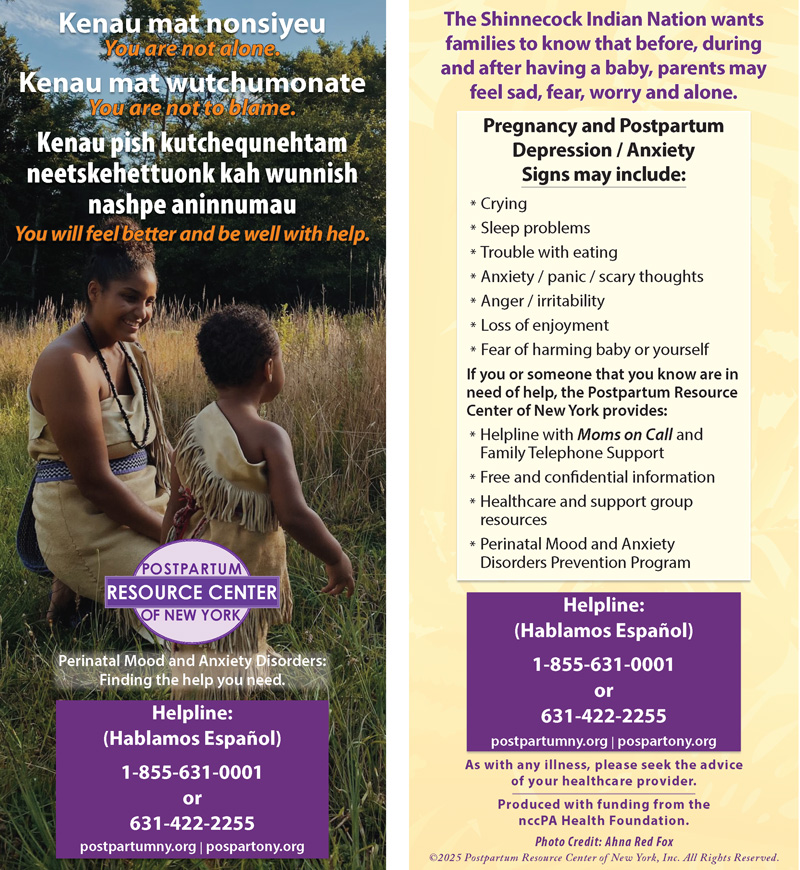It is well known that Indigenous populations such as Native Americans (N.A.) often have limited access to healthcare and suffer from health disparities and inequities in care. This is especially true of N.A. women suffering from maternal mental health issues such as postpartum depression (PPD) (Margerison et al., 2021). According to the CDC, PPD occurs in approximately 1 in 8 women, with the incidence increasing to 1 in 5 depending on the state and race/ ethnicity of the mother (“Depression Among Women”, 2020). It is also the most common complication associated with childbirth. While the prevalence of PPD in all women in the U.S. is about 11%, the prevalence of PPD in American Indian/ Alaska Native women is much higher at 14%-29.7% (Heck, 2021). Maternal suicide is also a significant issue with increasing rates over the last several years, and these deaths have been more commonly found than those from maternal hypertensive disorders or from postpartum hemorrhage (Palladino et al., 2011). Deaths from maternal suicide also demonstrate ethnic and racial disparities, with N.A./Alaska Native women at much higher risk-almost 3x higher- than non-Hispanic white women who are also at higher risk compared to their Hispanic, non-Hispanic Black and non-Hispanic Asian/ Pacific Islander counterparts (Margerison et al., 2021). With the effects of PPD on the mother to include issues with physical and mental health, relationship issues including mother-infant bonding, and infant effects to include problems with growth and development and cognitive and behavioural issues, recognizing and treating these mothers before lasting effects occur is imperative (Slomian et al., 2019). O’Connor et al. (2019) found that screening for perinatal depression may help decrease symptoms of depression and decrease depression prevalence, and that treatment (including medication, counseling, and behavioral therapy) increases the chances of remission in women with PPD.
Increased awareness of perinatal mood and anxiety disorders (PMADs) is vital to changing these statistics. Connecting to Indigenous populations (especially their healthcare providers) can open a dialogue about the importance of supporting new mothers within their communities. Providing knowledge about signs and symptoms, risk factors, screening tools, support services, etc., can enable Indigenous healthcare providers to better care for their mothers who may be suffering in silence. Making the connection with Indigenous communities can be difficult due to their understandable reluctance to engage with outsiders. Locating healthcare providers who may be open to communication, such as social workers, doulas, midwives, and holistic healers in Indigenous communities through websites and community connections, can open the door to a wonderful partnership.
After becoming aware of the startling suicide statistics for Native American and Alaskan Native women during a webinar, I felt the need to act. I consulted with another member of the Hofstra PA faculty, Amy Roberts, and reached out to Sonia Murdock, Executive Director of the Postpartum Resource Center of New York, Inc. (PRCNY), about a potential project with the Shinnecock Indian Nation, our neighbors on the eastern part of Long Island. The PRCNY is a non-profit organization in New York for which I have volunteered for the last 23 years after suffering from a PMAD myself with my younger son. It provides education, support, and resources for mothers and families suffering from PMADs across New York State. We were fortunate enough to connect with Ahna Red Fox, a doula and respected member of the Shinnecock Indian Nation who wanted to learn more about the project. The core group met several times to speak about the goals and objectives of the project. Our ultimate goal was to empower Ahna and other healthcare providers to help the women of their community who would be more comfortable discussing difficult topics with members of their own community.
Amy Roberts and I obtained a “Be the CHANGE” grant from the nccPA Health Foundation to fund the “train the trainer” project of enhancing access to maternal mental health screening, support, and education for the Indigenous women of the Shinnecock Indian Nation. This would be accomplished by providing education and training workshops about PMADs to their healthcare providers. Once trained, these healthcare providers would then be better able to serve the mothers of their community by educating them and their community members about PMADs, identifying those at risk for a PMAD through screening, and providing assistance for those suffering from a PMAD through telephone support, support groups and resources for treatment. First-year didactic Hofstra PA students also benefited from increased awareness about the health disparities that exist in this Indigenous population through a 2-hour lecture given by Ahna Red Fox at the end of the project.
We had several anticipated outcomes of the grant project: increased immediate and long-term awareness of PMADs in marginalized populations , specifically Indigenous women; increased immediate and long-term PA student awareness of PMADs and maternal mental health issues in Indigenous women; early, immediate, and long-term identification of PMADs in Indigenous women; increased immediate and long-term access to care for maternal mental health in the Shinnecock Indian Nation population; implementation and access to maternal mental health telephone support immediately and long-term; formulation of maternal mental health support groups for the Shinnecock Indian Nation population immediately and long-term; and lastly to replicate this training and project in order to support and serve other marginalized populations.
To achieve our desired outcomes, we held six training sessions- non-consecutive except for the first 2-day training. All were held virtually via Zoom and included two days of PMAD education, a one-day description and use of screening tools (including the Edinburgh Postnatal Depression Scale), a one-day telephone support workshop, and a two-day support group training workshop. The one-day telephone support workshop was taught by Sonia Murdock and included “Social Support: PMAD: Steps to Wellness” and “The Changing Face of PMADs in the Community: Offering Social Support with Telephone Support” modeled from what is used at the PRCNY. The two-day support group training workshop included how to facilitate support groups for mothers suffering from PMADs, and provided training, support services, and materials to group facilitators so they may offer the PRCNY’s Circle of Caring support group to the populations they serve in their community. All sessions had an opening welcome and Shinnecock blessing from Ahna Red Fox. Attending the 2-day PMAD Education Workshop from the Shinnecock Indian Nation was Ahna Red Fox, a social worker from the Shinnecock Indian Nation, and several tribal leaders. The subsequent sessions were attended by Ahna Red Fox and the social worker that attended the first sessions.
In addition to the training sessions, the core group also developed a palm card with information about PMADs and resources that was adapted from PRCNY palm cards but tailored for the Shinnecock Indian Nation. Some of the language on the card was in the Shinnecock native language, and the Shinnecock Indian Nation’s colors of purple and yellow were also used, as well as a photo of a Shinnecock Indian Nation mother and child in their nation’s attire. The informational palm cards were distributed in their community centers, family center, preschool, health clinic, and directly to pregnant and postpartum mothers from their healthcare providers.
Along the way, we had assured Ahna that even at the conclusion of the project, we would continue to support their community as much or as little as she felt necessary. Since completing the project, she has implemented support services for the Shinnecock community’s perinatal families and expanded her knowledge about PMADs to further help her community. In September 2023, at the PRCNY’s 25th Anniversary Gala, Ahna was the recipient of the Community of Caring Award for her contributions to her community in the fight to raise awareness and support for those suffering from PMADs. We continue to include Ahna in our advocacy to change policy for mothers and families both in New York State and federally, and we have some new projects that we are looking to implement to further combat the racial inequities in maternal mental health in Indigenous populations. Sonia, Amy, and I also learned many things from Ahna and the tribal leaders involved in the training sessions. In many ways, I learned more from them than they did from us. I learned that there are ways of respectfully empowering Indigenous healthcare providers to identify and support mothers suffering from a PMAD in their communities by ensuring that they are stakeholders in the process, and that we were there to learn from them as well and learn about what makes their community unique. I also learned to be aware of avoiding the “White Savior Complex” and to ensure that the people of the Shinnecock Indian Nation knew that we were there for guidance and support in the process, to empower them to help the mothers and families of their community. This project has enriched my life and career as a healthcare provider and fostered in me a desire to continue working with marginalized populations, not only for their benefit but also for my own. To quote Marine Corps 1st Lt. Travis Manion on why he chose to be deployed to Iraq a second time, “If not me, then who?”
Mary Banahan, MS, PA-C, is Dual Degree Coordinator, Associate Professor at Hofstra Northwell Department of Physician Assistant Studies. She can be reached via email at Mary.K.Banahan@hofstra.edu or by phone (631) 721-3576.
References
Depression Among Women. (2020, May 14). Retrieved from https://www.cdc.gov/reproductivehealth/depression/index.htm#Postpartum
Heck, J. L. (2021). Postpartum Depression in American Indian/Alaska Native Women. MCN: The American Journal of Maternal/Child Nursing, 46(1), 6-13. doi:10.1097/nmc.0000000000000671
Margerison, C. E., Roberts, M., Gemmill, A., Goldman-Mellor, S. (2021). Pregnancy-associated deaths due to drugs, suicide, and homicide in the U.S. 2010-2019. Obstetrics and Gynecology 2021 [in press].
O’Connor E., Rossom R., Henninger M., Groom H., Burda B. (2016). Primary Care Screening for and Treatment of Depression in Pregnant and Postpartum Women: Evidence Report and Systematic Review for the US Preventive Services Task Force. JAMA, 315(4):388–406. doi:10.1001/jama.2015.18948
Palladino, C. L., Singh, V., Campbell, J., Flynn, H., & Gold, K. J. (2011). Homicide and suicide during the perinatal period: Findings from the National Violent Death Reporting System. Obstetrics and Gynecology, 118(5), 1056–1063. Retrieved from https://doi.org/10.1097/AOG.0b013e31823294da
Slomian, J., Honvo, G., Emonts, P., Reginster, J. Y., & Bruyère, O. (2019). Consequences of maternal postpartum depression: A systematic review of maternal and infant outcomes. Women’s health (London, England), 15, 1745506519844044. https://doi.org/10.1177/1745506519844044





